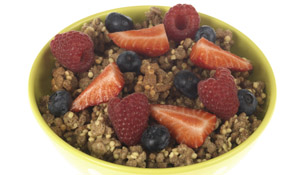
Do you believe that what you eat may be to blame for your constipation? While the food and constipation link isn’t as strong as you might think, some people do think there is a connection.
Constipation Causes
Constipation is the formal name for having difficulty passing a bowel movement, or having infrequent bowel movements. Some of the many possible causes include not drinking enough water, not getting enough fiber in your diet, or having another condition that impacts bowel function. Then there’s those food choices.
Richard Desi, MD, a physician at The Melissa L. Posner Institute for Digestive Health & Liver Disease at Mercy in Baltimore, Maryland, points out that from a medical perspective, there’s actually not a general list of foods that trigger constipation for everyone. Constipation is a very personal thing (in more ways than one), and what causes problems for one person may not bother someone else. However, poor nutrition choices overall can certainly contribute to stomach and intestinal issues and other health problems in some individuals. Just keep in mind that many people can eat a poor diet and still have normal bowel function.
Foods That May Worsen Constipation
If you suffer from occasional constipation or are guilty of making poor food choices, here are some specifics on things you might want to avoid—or at least become more aware of—in your diet:
- Processed foods: White breads, cakes, cookies, potato chips, and other processed foods may be tasty and convenient, but they aren’t doing your body any good and they could even be making your constipation worse. That’s because these choices often take the place of healthy fruits and vegetables that are loaded with fiber, which is a nutrient that helps waste move through your digestive tract so it can be easily passed. The latest Academy of Nutrition and Dietetics recommendation is for adults to aim for 20 to 35 grams of fiber a day. Some good fiber choices include apples, bananas, beans, and nuts.
- Dairy products: While there’s no research that links cheese, milk, and ice cream to constipation, there’s anecdotal evidence galore suggesting that eating high quantities of cheese and other dairy products can be binding, making stools firmer and hard to pass. If you suspect that excess dairy is affecting your bowel function, it’s a good idea to cut back, especially since dairy products can be high in calories and fat.
- Meats: While protein is important, your best bet is to get it from low-fat and healthful sources. Also pay attention to portion sizes, since loading your plate with a hamburger or steak may make you less apt to eat those important high fiber foods.
- Alcohol and caffeine: Beverages that contain alcohol or caffeine can be dehydrating, which can make it more difficult for the fiber you are eating to do its job properly. Skip the beer, wine, and soda, and instead select water or fruit juices that are low in sugar and higher in nutrients.
More General Guidelines
Keep in mind that for some people who suffer from constipation, increasing fiber intake and making some of these dietary changes can offer welcome relief. But for others, a laxative may be needed to help restore proper bowel function. Additionally, if constipation is a new problem, Desi recommends seeing a doctor to have the symptoms evaluated and to rule out other possible health problems.
Richard Desi, MD, The Melissa L. Posner Institute for Digestive Health & Liver Disease, Mercy, reviewed this article.
Sources
Richard Desi, MD, The Melissa L. Posner Institute for Digestive Health & Liver Disease, Mercy, Baltimore, MD. Email interview, June 5, 2014. https://mdmercy.com/centers-of-excellence/digestive-health-and-liver-disease/about-the-center?sc_lang=en
National Digestive Diseases Information Clearinghouse. "What I Need to Know About Constipation." Last updated online May 28, 2014.





